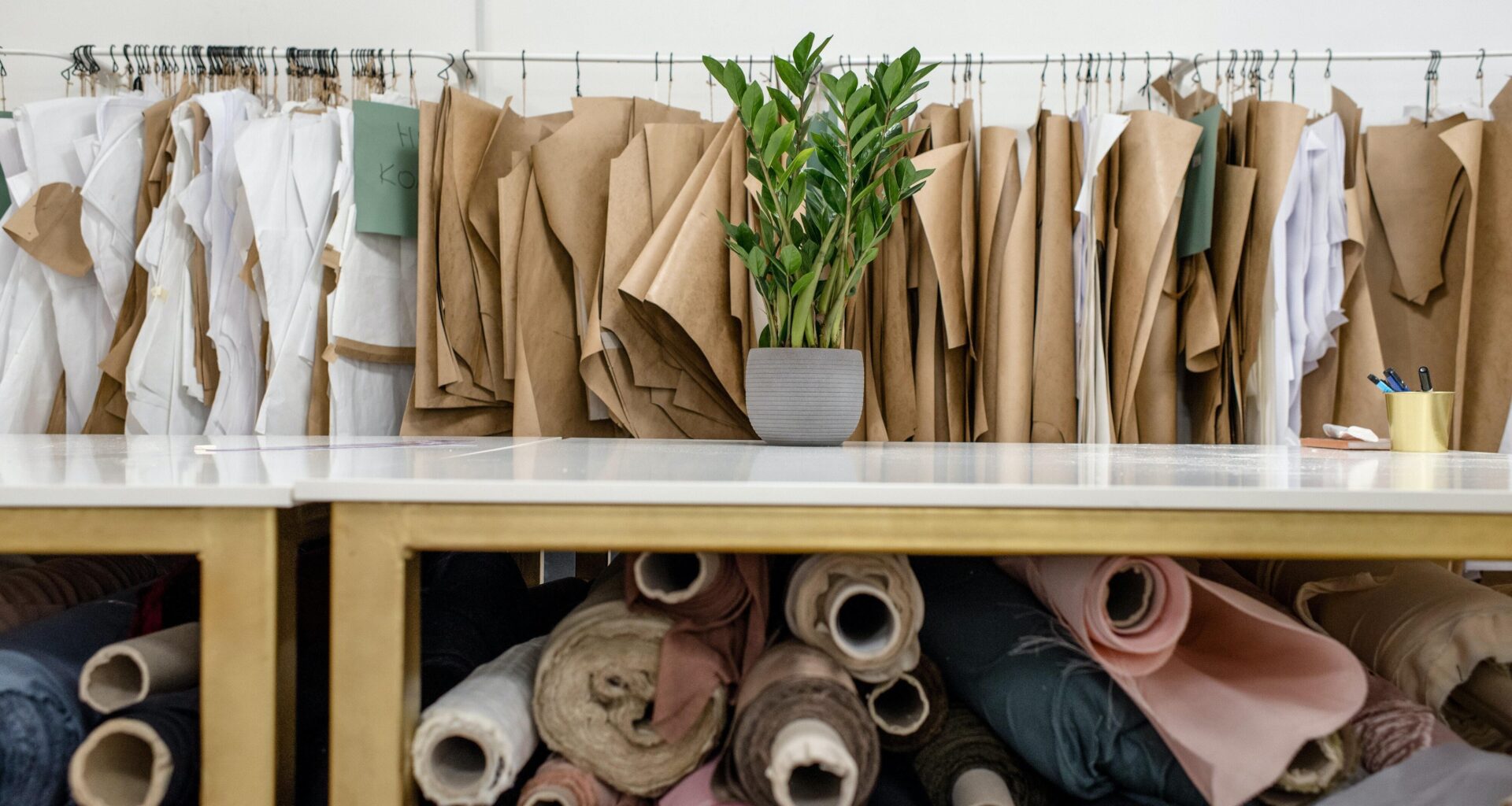Sustainability is an issue that affects every aspect of our lives and the fashion industry is no exception. As companies become more conscious of climate change and face growing demand from environmentally-conscious consumers, new sustainability job opportunities are being created. In addition, some of the existing roles that traditionally didn’t have a sustainability component see their duties being expanded.
If you dream of a career in fashion and you would like to add a sustainability component to it, rest assured that there are many possibilities to choose from as sustainable fashion jobs are in high demand nowadays.
On Glam Observer, we love explaining to you about the different fashion careers, and today, we are going to discover the 12 most popular fashion jobs in sustainability, and how to get one.
12 Sustainable Fashion Jobs + How To Get One
When it comes to careers in fashion sustainability, there are many different roles out there. Some of them are related to the creative side of the industry, while others are tied to management and communication.
Sustainability Intern
If you are looking for opportunities in sustainable fashion and you are just getting started in the industry, you should look for fashion internships. You will often find offers titled “Sustainability Intern”.
In general, as a sustainability intern, you will support the sustainability team with managing the different projects, analyzing data about the brand’s environmental impact, monitoring the progress in the work on the objectives set out in the sustainability strategy, preparing reports, and communicating with stakeholders.
But if we want to get specific, then depending on the company and the department, the role of a sustainability intern can encompass different tasks. Your duties won’t be the same if you work alongside a sustainable product developer or a PR manager. Therefore, pay attention to the job description to see if your responsibilities will be more oriented to creativity or the business side of the company.
Fashion Designer
If you are wondering how sustainable fashion designers are different from regular fashion designers, here is the answer.
The general responsibilities are the same. Fashion designers work on developing creative concepts and themes for each collection. They conduct research, gather inspiration, and create mood boards to establish the overall aesthetic and direction of the brand. The fashion design department creates detailed sketches and technical drawings of garments, accessories, and other fashion items, and then selects the appropriate fabrics, materials, and trims for each design.
When you work for an environmentally friendly brand, in addition to the common tasks that every designer does, a sustainable fashion designer pays attention to every part of the design process and its impact on the environment, animals, and people. This is a role that has the power to influence people to invest in eco-friendly and cruelty-free products.
Sustainable Product Developer
A Sustainable Product Developer manages, as per the title, the development of the specific product category (accessories, women’s, shoes…) with a focus on sustainability and innovation. They take care of every product development stage, from conceptual design, sample mock-up, and interaction with suppliers and other departments, to final production to ensure product sustainability.
This role requires working collaboratively across internal teams and managing relationships with external agencies, factories, and suppliers to implement more sustainable practices. The product developer works with manufacturers by monitoring supplier performance and delivery schedules, negotiating prices, and analyzing product costs. They also work with internal and external designers to collect certifications on fabric and design quality control and, recommend sustainable manufacturing techniques and materials that are more environmentally friendly.
Sustainable Textile Specialist
Within the sustainable fashion world, a textile specialist plays a very important role because they help address environmental issues generated by textiles, such as excessive water consumption and pollution. For example, they can research materials and fiber to understand how they change in certain conditions (the tie-dye is a good example), experiment with how to make clothes and accessories last longer and make them more organic without using harmful chemicals or apply their knowledge to reuse recycled textiles.
Sustainable Sourcing Manager
This role is similar to the one of a Textile Developer in terms of conducting research into innovative and sustainable ingredients or materials, but additionally, a Sourcing Manager is responsible for bringing them to life by actually sourcing them. They have an ethical responsibility to maintain a trustworthy, safe, and transparent ethical compliance program for suppliers and factories their company works with. They have to make sure cross-functional teams align both with customer needs and supply chain capabilities.
Sustainable Supply Chain Manager
The Sustainable Supply Chain Manager plays a crucial role in a fashion company’s sustainability by identifying and managing the best suppliers to provide sustainable fabrics, trims, and other components required for fashion production. They are also responsible for addressing any quality issues or non-compliance with regulations from suppliers and manufacturers. They monitor supplier performance to ensure timely and quality deliveries, coordinate the transportation of materials, semi-finished goods, and finished products throughout the supply chain, and manage the warehousing and distribution of fashion products.
Sustainable Buyer or Merchandiser
Buying is a dream career for many fashion enthusiasts, and the good news is that it can have a sustainability component. A Sustainable Fashion Buyer is not that different from a regular Buyer, except they focus specifically on developing a sustainable collection. They can work for a sustainable fashion brand, manage eco-friendly products in a brand’s sustainable category, or be in charge of several sustainable labels in a department store.
They analyze the sustainability market in the fashion industry, as well as customers’ purchasing habits in relation to sustainability, and which items are selling best to understand what type of sustainable products would sell in the future, to decide which ones will be available in the brand’s or retail department’s stores.
The role of a fashion buyer is closely linked to the one of a fashion merchandiser, so I recommend reading the job description carefully, as the roles can be interlinked or totally differ depending on the company.
Sustainability Manager
Sustainability managers are among the big players in a fashion company. They take control of the development, implementation, and monitoring of environmental strategies, programs, and policies within an organization. They act as project managers, ensuring the company’s sustainability goals are respected and applied throughout the different departments and adhering to industry regulations.
A Sustainability Manager’s task range can be quite extensive because this role requires a broad knowledge – from sourcing to textile management to product development, to what’s happening in the supply chain. This involves communicating with everyone involved – Product Development, Design, Logistics, Marketing, and Communications teams – to ensure progress on environmental responsibility is shared and embedded throughout the company.
Corporate Social Responsibility (CSR) Manager
A CSR Manager is also a leading role in the company’s sustainability area. They play a similar role as a sustainability manager, creating and implementing strategies that make companies more sustainable, and overseeing the progress in the different departments. However, their role extends to preserving the company’s vision and reputation with internal and external stakeholders, which includes the board, investors, the press, environmental organizations, and so on, ensuring the company is compliant with a multitude of global legislations. They also manage corporate social responsibility programs to protect workers’ rights.
Sustainability PR Manager
Fashion Sustainability is not only about designing and sourcing an environmental-friendly product, and developing sustainable strategies. This is just one side of how a fashion company operates in the field of sustainability, but what also matters at the end of the day is to communicate about it to the public, and this is the responsibility of a PR Manager.
PR Managers play a huge role in informing about fashion sustainability. They help brands to communicate their actions in a clear and convincing message that will resonate and build trust with the consumers who nowadays ask for more transparency. So they are like the bridge between the brand and the consumer. Public Relations can shift the consumers’ behaviors in one direction or the other: if they manage to send a strong message, this shift can be positive. Otherwise, it can weaken the brand’s relations with people and make them question whether they should buy the product or not.
A Sustainable PR specialist’s responsibilities include brainstorming, planning, and executing sustainable strategies and campaigns.
They take care of press releases, organize events, and other activities that allow them to spread the message about what fashion companies are doing for sustainability. They often collaborate with other departments to gather more information that they can use for their communication purposes.
In order to communicate messages about sustainability properly, a PR manager must ensure the brand has adequate proof of the actions it takes to facilitate the brand’s relationship with the media and customers. Their role can overlap with the one of a Sustainable Marketing Manager depending on the company. However, the main difference is that a Marketing specialist promotes the brand to drive sales, while a PR Manager goes beyond the marketing by providing real data. It’s no longer enough to create a beautiful image around a product to sell it, as people are paying more attention to the labels, and they recognize greenwashing attempts more easily as well.
You can learn more about how sustainability is influencing fashion PR here.
Sustainability Marketing Manager
What makes a Sustainability Marketing Manager different from other Marketing Managers? Well, sustainable marketers focus on promoting a brand through a sustainability lens with attention to customers who are interested in all things sustainable in fashion. They ideate and prepare marketing materials and campaigns emphasizing the company’s sustainable practices, test and set up ads targeting people interested in sustainability, plan and manage sustainability projects, special launches, and events, analyze the sustainability campaigns to measure their success and improve performance, prepare documentation like reports and presentations about sustainability, and build relationships with internal and external stakeholders.
Sustainable Fashion Writer
If you are an aspiring fashion writer with a passion for sustainability, you can bring these two interests together and become a sustainable fashion writer. Sustainability fashion journalism focuses on raising awareness about environmental issues present in the industry. There are many topics that you can cover as a sustainable fashion writer: discuss sustainability challenges in fashion and its impact on the environment, report facts and figures, talk about which fashion companies are leaders in sustainability and which have more efforts to do in that regard, give advice on how to become an environmental-conscious consumer, and so on.
The 12 sustainable fashion jobs above can give you an idea of the tasks they could give you as an intern. In fact, when we add the word “manager”, “specialist’ or similar roles, it doesn’t mean they are only open to senior positions, but that we mean to define the job and give you an idea of the tasks it involves. It doesn’t mean you will be doing the exact same thing as an intern but you might as well be involved in these tasks at a lower level, providing support to the sustainability team. Plus, you have to be ready for them as you will be climbing the career ladder.
So, when you search for fashion careers in sustainability, you can add the keywords “intern”, “assistant”, “coordinator”, “manager” etc. according to your level of experience.
How To Get A Job In Sustainable Fashion
As we said at the beginning of this article, if you want to start your career in sustainable fashion, you need to look for internships in that field. Start by searching for open vacancies on the official websites of fashion companies or LinkedIn. If you find an opportunity that interests you, you can create job alerts to receive similar offers in the future. You can read more about where to find fashion jobs and internships here.
Although sustainability is popular these days and many companies are actively embracing sustainable practices throughout their supply chains, when searching for job opportunities, it is advisable to prioritize companies with established sustainable practices, as they are more likely to have a variety of roles available in this department.
Another tip to find more sustainable fashion jobs is to follow the news and sustainable fashion forums and pay attention when brands announce new sustainability initiatives, as they are likely to be recruiting people to oversee and manage these new activities.
If you haven’t come across any internship offer in fashion sustainability, fear not and try an unconventional strategy called “cold emailing”(we teach more about this strategy in a free webinar, register now here). It is a great way to find an internship to start your career in fashion sustainability (or any of your dream fashion job, really) and gain experience to later find a full-time job. So instead of waiting for one to come (because we don’t know when that might happen, right?), you should be proactive and send a spontaneous application to your favorite department store or eco-friendly brand.
Sustainable Fashion Brands
Sustainable fashion brands prioritize environmental and social responsibility throughout their entire supply chain and operations. They strive to minimize the negative impacts of the fashion industry on the environment, workers, and communities while promoting ethical practices and transparency. These companies often use different strategies to achieve sustainability, such as using eco-friendly materials, reducing waste and pollution, ensuring fair labor practices, supporting local artisans, and promoting recycling and upcycling.
Stella McCartney is renowned for its dedication to sustainability. The brand avoids using leather and fur, promotes the use of organic and recycled materials, and emphasizes ethical manufacturing processes.
Vivienne Westwood is another luxury brand famous for its use of sustainable materials and technologies, as well as its environmental and human rights campaigns.
Burberry has included in its corporate strategy some initiatives like support to farming communities, nature restoration, chemicals management, and the extension of product life through repair, resale, and rental programs.
LEVI’S is notable for improving its animal welfare policy and introducing lower-cost financing to suppliers implementing low-carbon processes. The brand relies on Water Less technology and is committed to reducing water use during manufacturing by 50% in areas of high water stress by 2025.
Everlane has reached 90% of its goal to design out all virgin plastics from its products and packaging. The brand is also recognized for endorsing the U.S. FABRIC Act, which will introduce joint accountability among brands, retailers, and manufacturers for workplace wage violations.
Other brands that are strong in sustainability practices, according to the 2022 fashion accountability report of Remake, are Patagonia, American Eagle Outfitters, Columbia Sportswear, Gap Inc. (GAP, Old Navy, Banana Republic, Athleta), Kering (Gucci, Balenciaga), Levi Strauss & Co., H&M Group (H&M, COS, ARKET, & Other Stories), Lululemon, PUMA, Ralph Lauren, Reformation, and Target.
What To Study To Work In Sustainable Fashion
There isn’t one single path to becoming a Sustainable Fashion Specialist, as companies hire people of different profiles and backgrounds. What to study also depends on what kind of sustainable fashion job you want to do.
Studies in Sustainability would be a safe way to go if you want to study this topic in depth or if you are undecided between several roles.
Some people who work in fashion studied biology or chemistry and now work as Textile or Sourcing Managers. So in case you were afraid that you couldn’t get into fashion with a scientific degree, that’s good news 😉 Most of the employees in a fashion company hold in fact traditional degrees; they didn’t attend a fashion school.
If you are interested in the creative side of the industry, then of course a degree in Fashion Design, Textile Management, Product Development, Supply Chain, or other career that will allow you to do sustainability-oriented tasks around a product.
If you feel more drawn toward fashion business and communication-oriented careers in sustainability, then studies in Marketing, PR, Communication, Business, or Management are all fair options.
These are just examples but know that regardless of what you studied or what you choose to study, it won’t determine your career path. There are so many stories of great designers who are self-taught or studied something totally unrelated to their job, journalists who became PR managers, or graduates in management who became Sustainability Managers. And you can too break into fashion or change your career path if you have the necessary skills. Your knowledge and skills are what really matters to fashion companies, besides what you studied.
Skills To Work In Sustainable Fashion
Interest in Sustainability
First of all, an interest in sustainability is key if you want to work in this field. Despite the fact that brands make more and more efforts towards being eco-responsible, that’s not an easy job and progress still has to be made. Creating a sustainable product, developing a successful sustainability program that will be effective in the long run, and making people more environmentally conscious are things that take a lot of time and energy. Therefore, committing to working in sustainability involves having a strong passion and determination to make actual progress. Sustainable fashion managers also need to be problem solvers with a solution-oriented attitude.
Creativity & Innnovation
If we look at any career in sustainability, you will realize that they all need a lot of creativity and innovation, whether it’s to come up with a new sustainable product idea, an alternative eco-friendly fabric, or build a campaign that will influence customers to buy sustainable fashion pieces.
Strategic Mindset and Project Management Skills
Strategic mindset and project management skills are essential, especially for roles that involve leadership and planning as we saw with the example of Sustainability Managers and Corporate Social Responsibility Managers.
Many times during your job as a Sustainable Intern, Assistant, or Manager, you will have to do research and analysis of different data to help you carry out your tasks. Knowledge of Excel can help you with that, and also to stay organized in your office.
Teamwork, Excellent Communication and Presentation Skills
Teamwork and excellent communication and presentation skills are very important for a career in fashion sustainability, as you must be able to build relationships with different stakeholders, influence people, and manage and navigate the different parts of the business.
We hope you understand better the different careers in fashion sustainability. Perhaps you spotted a role you like and want to know what to do next. On glamobserver.com, we have many resources for you to break into the fashion industry.
You can also sign up for my free webinar where I teach unconventional strategies to break into the industry.








